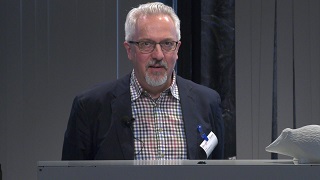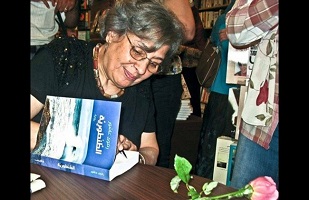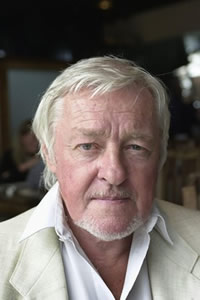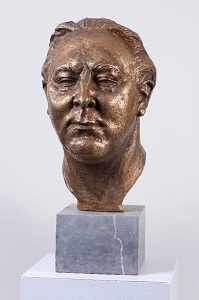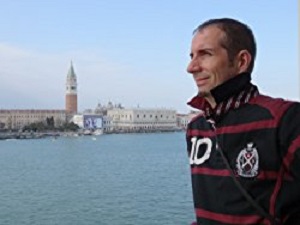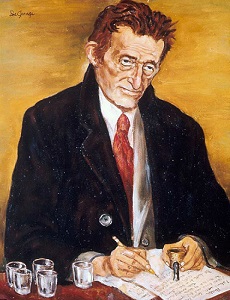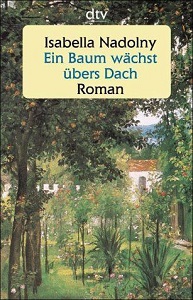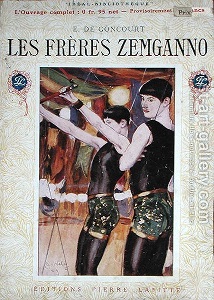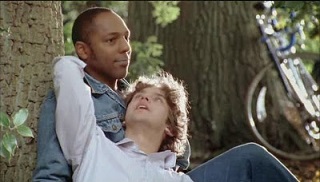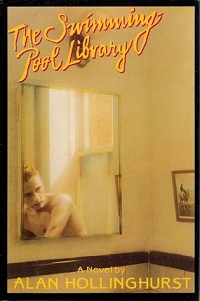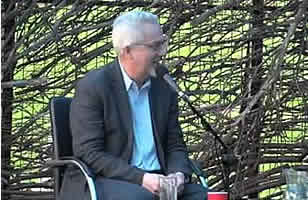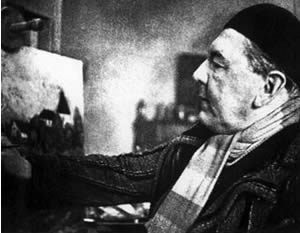Dolce far niente
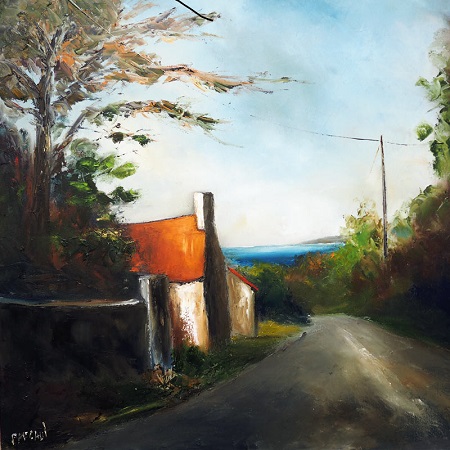
The Road Home door Padraig McCaul, 2018
The Way Home
Many dreams I have dreamed
That are all now gone.
The world, mirrored in a dark pool,
How unearthly it shone!
But now I have comfort
From the things that are,
Nor shrink too ashamed from the self
That to self is bare.
More than soft clouds of leaf
I like the stark form
Of the tree standing up without mask
In stillness and storm,
Poverty in the grain,
Warp, gnarl, exposed,
Nothing of nature’s fault or the years’
Slow injury glozed.
From the thing that is
My comfort is come.
Wind washes the plain road:
This is the way home.
Robert Binyon (10 april 1869 – 10 maart 1943)
Lancaster, de geboorteplaats van Robert Binyon
De Britse schrijver Alan Hollinghurst werd geboren op 26 mei 1954 in Stoud, Gloucestershire. Zie ook alle tags voor Alan Hollinghurst op dit blog.
Uit: The Sparsholt Affair
Victor?’ The world knew Evert’s father as A. V. Dax, but we claimed this vicarious intimacy. Evert had already slipped away towards the window, and stood there peering into the quad. There was always some tension between him and Peter, who liked to provoke and even embarrass his friends. ‘Oh, I’m not sure about that,’ said Evert, over his shoulder. ‘Things are rather difficult at present.’ `Well, so they are for everyone,’ said Charlie. Evert politely agreed with this, though his parents remained in London, where a bomb had brought down the church at the end of their street a few nights before. He said, rather wildly, `I just worry that no one would turn up.’ `Oh, they’d turn up, all right,’ said Charlie, with an odd smile. Evert looked round, he appealed to me – ‘I mean, what do you make of it, the new one?’ I had The Gift of Hermes face down on the arm of my chair, about halfway through, and though not exactly stuck I was already alternating it with something else. It was going to break my daily rhythm, and was indeed rather like tackling a book in a foreign language. Even on the wretched thin paper of the time it was a thick volume. I said, ‘Well, I’m a great admirer, as you know.’ `Oh, well, me too,’ said Peter, after a moment, but more warmly; he was a true fan of A. V. Dax’s large symbolic novels, admiring their painterly qualities, their peculiar atmospheres and colours, and their complex psychology. ‘I’m taking the new one slowly,’ he admitted, ‘but of course, it’s a great book.’ `Any jokes in it?’ said Charlie, with a hollow laugh. `That’s never quite the point,’ I said, ‘with a Dax novel.’
`Anyway, haven’t you read it?’ said Peter, going over to the window to see what Evert was looking at. Poor Evert, as I knew, had never read more than the opening pages of any of his father’s books. ‘I just can’t,’ he said again now, ‘I don’t know why’ – and seeing Peter join him he turned back into the room with a regretful look. After a moment Peter said, ‘Good grief . . . did you see this, Dax?’ `Oh . . . what’s that . . . ?’ said Evert, and I was slow to tell the new confusion from the other. `Freddie, have you seen this man?’ `Who is it?’ I went across. `Oh, the exhibitionist, I suppose you mean,’ I said. `No, he’s gone . . .’ said Peter, still staring out. I stood at his shoulder and stared too. It was that brief time between sunset and the blackout when you could see into other people’s rooms. Tall panes which had reflected the sky all day now glowed companionably here and there, and figures were revealed at work, or moving around behind the lit grid of the sashes. In the set directly opposite, old Sangster, the blind French don, was giving a tutorial to a young man so supine that he might have been asleep. And on the floor above, beneath the dark horizontal of the cornice and the broad pediment, a single window was alight, a lamp on the desk projecting a brilliant arc across the wall and ceiling. `I spotted him the other day,’ I said. `He must be one of the new men.’ Peter waited, with pretended patience; and Evert, frowning still, came back and looked out as well. Now a rhythmical shadow had started to leap and shrink across the distant ceiling.”
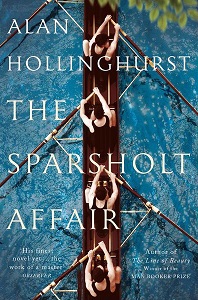
Alan Hollinghurst (Stoud, 26 mei 1954)
Cover
De Egyptische schrijfster en literatuurwetenschapster Radwa Ashour werd geboren op 26 mei 1946 in Caïro. Zie ook alle tags voor Radwa Ashour op dit blog.
Uit:Granada (Vertaald door William Granara)
“The inside room of the bathhouse was packed with clients. Some were seated on the tile bench next to the furnace sweating in the thick steam; others went into the pool to purify themselves before bathing. There were men lying down, on their stomachs and on their backs, submitting themselves to a servant or a bath attendant who busily groomed them, massaged them, or simply poured hot water over their heads. All of the men were engaged in some kind of conversation as their voices cut across both ends of the bath. Even those in the private rooms for hair-removal contributed to the banter from behind a curtain that shielded the others from their stark nakedness. Saad and his master sat cross-legged in their usual spot next to one of the water heaters. His master stretched out his arms while Saad poured water and lathered the washcloth, then he began to scrub his right hand and arm, then the underarm, before moving over to the left. Someone yelled out: “Abu Jaafar, may God be pleased with you! We don’t have the privilege of choosing one thing or another. It’s our fate! We’re defeated, so how can we choose?” Another bather interrupted. “I’m with you! The agreement is evil, there’s no doubt about it. Our leader was in a difficult situation, and the resistance that Ibn Abi Ghassan wanted to launch was doomed from the start. So what could he do, and what can we do in the face of their awesome army and their new Italian artillery?”
“We can fight them. I swear by the God of the Kaaba,’ we can fight them,” responded Abu Jaafar. Saad was following the conversation, straining to listen since he wasn’t able to see who was speaking because he was seated facing his master, and all that was in his view was the wall and the water heater to his left. “Why should we fight them? Aren’t ten years of war enough? Do you want us to end up like the people of Malaga eating our own mules and the leaves off the trees?” “After submission, they’ll teach us a lesson we’ll never forget. The treaty is nothing but a worthless piece of paper. If we surrender Granada to them, they’ll force us to drop to our knees whenever a clerical procession passes by. They’ll force us to live in separate quar-ters with only one gate, and they’ll put the sword of expulsion to our throats. What will prevent them from doing all of this once they take control of our country?” The master stretched out on his back while Saad worked on his knees. He massaged his upper body, stomach, and legs before the master turned over and Saad massaged his back. “Surrender will prevent them from doing any further damage to us, and it will allow us to maintain some of our rights.” “How so?” Other voices followed in repetition, in piercing tones that came close to screeching. The master pulled away his hand and sat upright. “The treaty stipulates that we be treated honorably, and that our religion, customs, and traditions be respected, and that we be free to buy and sell, and that we preserve our rights to our property, our arms and horses, and that we have legal recourse to our judges in ar-bitrating matters of dispute. Even our prisoners shall be returned to us, pardoned and free.” “Merely ink on paper:’ retorted Abu Jaafar.”
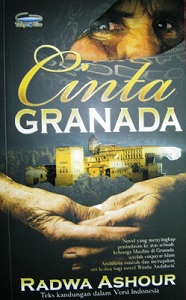
Radwa Ashour (26 mei 1946 – 30 november 2014)
Cover;
De Belgische schrijver Hugo Raes werd geboren in Antwerpen op 26 mei 1929. Zie ook alle tags voor Hugo Raes op dit blog.
Uit: Het jarenspel
“Ze zet hem dan flink op zijn plaats. Of ze neemt de verdediging op zich van een zwakkere, en zegt dat het een schande is. Zo is de tv-kijkkast de psychiater geworden van de gewone mens. Hij herkent er zijn eigen tekorten en gebreken in, met een glimlach, bij blijspelen en familiefeuilletons; zijn onzekerheid en angst, bij criminele geschiedenissen en geweldscènes, identificeert zijn verlangens met die op het scherm. De tv bevredigt zijn drang naar erotiek of melancholie, bevestigt zijn meningen, prikkelt en bevredigt nieuwsgierigheid, sterkt en neemt spanningen weg, en ook verveling. Hij laat pijn en smart vergeten, schenkt een zin aan zijn bestaan. Hij is zijn begeleider, zijn mentor, zijn priester, zijn niet-schoolse leraar, zijn persoonlijke hofnar, zijn troubadour. Hij is God. God is televisie. Is er wat bijzonders te melden? of niet? vraagt Willem. De telexmachine zwijgt even, overdenkt zijn situatie en antwoordt tetterend. Ja, inderdaad, er zijn een paar leerzame dingen bij, mompelt zijn menselijke compagnon. Hij leest. btl 037 – katmandu (reuter) in siddharthanagar in het zuidwesten van nepal wordt nog een primitieve versie van de leugendetector gebruikt om iemands schuld of onschuld vast te stellen: de vuurproef. naar het nepalese persbureau zondag jl. meedeelde, moet de beschuldigde drie stappen doen met in de handpalm een witgloeiend ijzeren bord. tussen de handpalm en het bord mag de beschuldigde wel bladeren met ghy (een soort boter) houden. als de handpalm brandwonden vertoont is de verdachte schuldig, zo niet is hij onschuldig. volgens het nepalese persbureau heeft onlangs een vijftigjarige van diefstal beschuldigde vrouw de vuurproef met succes doorstaan./.kv-ws.”
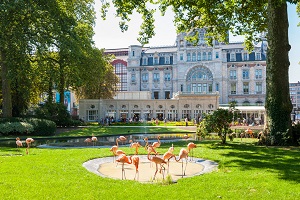
Hugo Raes (26 mei 1929 – 23 september 2013)
De ZOO in Antwerpen
De Tsjechische dichter en vertaler Vítezslav Nezval werd geboren op 26 mei 1900 in Biskoupky. Zie ook alle tags voor Vítězslav Nezval op dit blog.
Goodbye And A Wave
Goodbye and if we should not ever meet anew
it really was delightful and quite enough for some
Goodbye and if we should yet make a rendezvous
maybe instead of us another guest will come
It really was delightful but everything has an end
Hush tolling bell I know that sadness from before
A kiss a napkin siren ship’s bell to portend
three or four smiles and then to be alone once more
Goodbye and if we should not ever speak again
let there be something left a keepsake what we meant
as airy as a napkin more than a postcard plain
with suppositious scent of gilded ornament
And if I chanced to notice what others did not see
so much the better swift as you seek your home byre
You have shown me the south your nest there in etui
Your fate is flight my fate is song without a lyre
Goodbye and if this shall have been the final call
so much the worse my hope and nothing left all-told
If we would meet again then best not part at all
Goodbye and silken wave Let fate fulfilled unfold!
Vertaald door Václav ZJ Pinkava
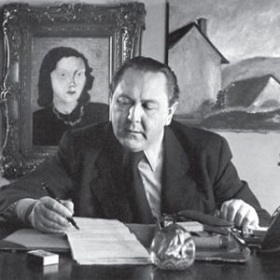
Vítězslav Nezval (26 mei 1900 – 6 april 1958)
Zie voor nog meer schrijvers van de 26e mei ook mijn blog van 26 mei 2018.

